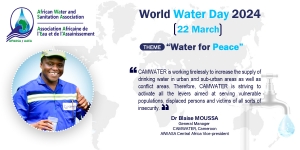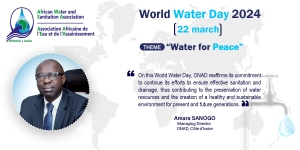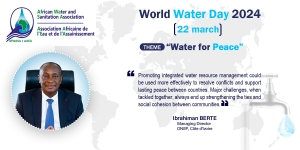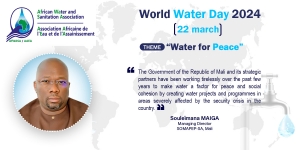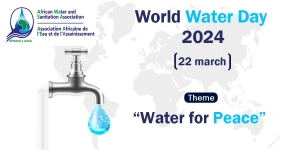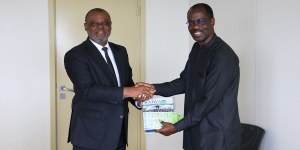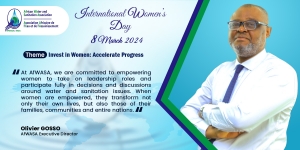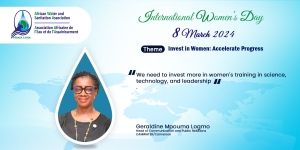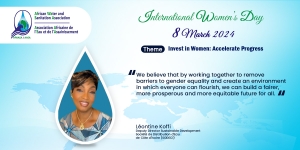Nzickonan Stéphanie
WWD 2024: Message from the Managing Director of Cameroon Water Utilities Corporation
The international community will this year celebrate the World Water Day under the theme “Water for Peace”. This theme challenges us in a particular and urgent way. In most of our countries, peace remains fragile. Moreover, social peace is a real commitment for drinking water soldiers that are water and sanitation utilities. Our daily lives are made up of many challenges that have to be overcome by African companies in charge of the distribution of drinking water and sanitation issues. Indeed, the supply of safe drinking water for the benefit of vulnerable groups is a factor of resilience and development in Africa in general and in Central Africa in particular, given the conflict-affected areas. These undermine the efforts made by our various Governments to increase the rate of access to safe drinking water in accordance with the Sustainable Development Goals (SDGs).
Aware of the challenges related to access to safe drinking water for the preservation of peace in general and social peace in particular, as well as its positive impact on survival and well-being of many refugees and internally displaced people arriving in Cameroon due to internal and external crises, the Cameroon Water Utilities Corporation (CAMWATER) has set to work resolutely, particularly in the border towns, with the support of the Government, bilateral and multilateral partners. In compliance with the instructions of H.E. Mr Paul BIYA, President of the Republic, reiterated in his message to the Nation on December 31, 2023, CAMWATER is working tirelessly to increase the supply of drinking water in urban and sub-urban areas as well as conflict areas. Therefore, CAMWATER is striving to activate all the levers aimed at serving vulnerable populations, displaced persons and victims of all sorts of insecurity. With the support of development partners and humanitarian agencies such as the International Committee of the Red Cross (ICRC), we have made significant investments to strengthen drinking water supply systems in the North west, South west and Far North Regions. These are direct impact projects to support these vulnerable populations and ensure peace. In 2024, CAMWATER will implement drinking water supply projects in the cities of Yaounde and Douala, given the massive presence of internally displaced persons as a result of the crisis in English-speaking regions.
Water for Peace is a perfect reflection of this holistic vision of peace and stability ensured by access to a vital need, necessary for the stability of our countries, our economies and fundamental to strengthen the resilience of communities affected by conflict.
WWD 2024: Message from the Managing Director of Office National de l'Assainissement et du Drainage, Côte d'Ivoire
On this World Water Day, ONAD reaffirms its commitment to continue its efforts to ensure effective sanitation and drainage, thus contributing to the preservation of water resources and the creation of a healthy and sustainable environment for present and future generations.
WWD 2024: Message from the Managing Director of Office National de l'Eau Potable, Côte d'Ivoire
The world's population is growing, the world has become a global village, distances between peoples are becoming narrower, and humanity is facing many challenges. A problem experienced in a country in the South has repercussions on the lives of people in countries in the North, and vice versa, because of the close links between peoples. To remedy this, we need to combine all our efforts.
In recent decades, the world has been faced with climate change, which is inevitably having an impact on water resources. These resources are a common good that involves us all, and that all nations agree must be preserved.
It is a major and complex challenge that we must face today. The water available, in limited quantities, must cover all uses. Human consumption, agriculture, industry, and energy production all require a balanced and concerted sharing of “blue gold”. The resource therefore needs to be preserved, so that we have quality water for present and future generations.
As a universal and indispensable resource, water can serve as a foundation for building trust and as a potential starting point for peace.
Promoting integrated water resource management could be used more effectively to resolve conflicts and support lasting peace between countries. Major challenges, when tackled together, always end up strengthening the ties and social cohesion between communities.
WWD 2024: Message from the Managing Director of Société Malienne de Patrimoine de l'Eau Potable
World Water Day (WWD) is an opportunity for all professionals in the sector to take a look back at the issue of access to drinking water in our countries and look to the future to meet the increasingly pressing challenges of climate change.
This year, the event is being celebrated under the generic theme of “Water for Peace”. This theme is perfectly suited to the national political will in the Republic of Mali. It aims to draw the attention of the highest authorities, stakeholders in the sector and the general public to the importance of water and the sustainable management of water resources as a factor for peace in a context of climate change.
With this in mind, the Government of the Republic of Mali and its strategic partners have been working tirelessly over the past few years to make water a factor for peace and social cohesion by creating water projects and programmes in areas severely affected by the security crisis in the country.
One such initiative is the Access to Drinking Water and Sanitation Project (AEPA), financed by KFW to the tune of CFAF 16 billion for the city of Timbuktu and the surrounding area.
The project will last 24 months from January 2024, and will cover the city of Timbuktu's water needs until 2040. This will have a short- and medium-term impact on limiting water stress and calming the social climate in the Timbuktu region.
In addition to this project, the Government of the Republic is committed to a vast water programme that will benefit the whole country. This makes sense in a country where access to drinking water is even part of cultural wisdom. “Aman, iman”: water is life, say the Tamasheq.
World Water Day 2024: AfWASA is committed to making universal access to water a reality Africa
The African Water and Sanitation Association, like the International Community, is celebrating World Water Day on the theme: "Water for Peace". To mark the occasion, AfWA, with the support of its members, is launching a communication campaign to reaffirm their strong commitment to making universal access to water a reality on the continent. During this week, Managing Directors of the Association's member companies as well as the Executive Director of AfWASA will share their views on the theme of the day, and their commitment to working together to improve access to water for the populations of their countries.
About World Water Day
Every year on March 22, World Water Day raises public awareness and encourages action to tackle the water and sanitation crisis. This annual United Nations celebration is coordinated by UN-Water and orchestrated by one or more of its members and partners working in related fields, including the African Water and Sanitation Association.
The theme of each edition which is suggested in advance by UN-Water, is aligned with the annual publication of the United Nations World Water Development Report, published by UNESCO on behalf of UN-Water as part of UNESCO's World Water Assessment Programme (WWAP).
In 2024, the theme of World Water Day is "Water for Peace", and the World Water Development Report is entitled "Water for Peace and Prosperity".The World Water Day campaign is simply entitled "Water for Peace".
We are hiring: GAPWAS PROJECT Officer
I. JOB DESCRIPTION
1.1. INTRODUCTION
GAPWAS (German-African Partnership for Water and Sanitation) is a cooperation project between German Water Partnership (GWP) and the African Water and Sanitation Association (AFWASA). It is financed by the German Federal Ministry for Economic Cooperation and Development and aims at improving the institutional framework conditions for water supply and sanitation in Africa. In this perspective the goal is to strengthen AfWASA through different activities and support. The expected results are an improved governance and management of the organisation, expanded sustainable and demand orientated services for members as well as expanded regional structures and international cooperation.
For the project office based in Abidjan we are looking for a dedicated, self-motivated, open- minded and reliable individual with great organizational skills and an affinity for numbers and accounting to fill the position of Project Officer.
1.2. MAIN MISSION
The Project Officer provides operational and administrative assistance to the Project Director, and the project team, based in Germany. She or he performs a variety of administrative, coordinating and logistical tasks in support of the operations of the project and assists the team and partners with information management.
1.3. TASKS AND ACTIVITES
Operational and Administrative Support
-
Maintains confidential records for the project and project team,
-
Acts as the main contact person during the absence of the Project Director, following - up on any emergencies,
-
Acknowledges receipt of correspondence and documentation in the absence of the Project Director and drafts preliminary versions of correspondence to be signed by the Project Director or relevant staff,
-
Assists team members in preparing and formatting documents, including Excel- Sheets and PowerPoint presentations,
-
Develops and maintains an efficient filing system for the project, including bills and financial documents,
-
Maintains and updates the project’s documents and contacts using the Microsoft Office Suite including Word, Excel, PowerPoint, and Outlook
-
Liaises with different AfWASA team members (communication, IT, finances, programs, monitoring & evaluation, etc) where needed in order to foster information sharing and harmonizing of activities, enabling an efficient project environment.
-
Prepares a bi-monthly project newsletter
-
Assists to maintain and update the project’s web site
-
Carries out specific web searches and downloads
-
Organizes/ coordinates regular meetings and conference calls/video-conferences, often across different time zones, including the preparation and distribution of documents and providing the necessary technical devices,
-
Attends meetings together with the Project Director, takes minutes and provides summaries in English
-
Liaises with other AfWASA and GWP staff as required, and provides assistance to short term experts and GWP staff when visiting the AfWASA headquarters
-
Prepares and adapts contracts and terms of references under the supervision of the Project Director
-
Performs other related duties in accordance with instructions from the Project Director.
Financial Management and accounting
-
Under the supervision of the Project Director prepares bi-monthly accounting documents to be sent to Germany
-
Contributes in preparing bi-monthly budgets and reports as required
-
Keeps an accurate petty cash book at all times
-
Provides updated reports to the Project Director and team in Germany;
-
Communicates with service providers and/or the purchasing department of AfWASA to obtain best possible rates and proformas as required
Workshops and Events
-
Liaises with AfWASA team members and external service providers regarding venues, travels, hotels, catering, technical equipment, overall organization and logistics for workshops and other activities that take place in different countries
-
Coordinates invitation and registration process and acts as contact person for the participants
-
Liaises with and assists project partners, participants and consultants as required to ensure smooth functioning of activities
-
Requests the issuance of visas by contacting the appropriate embassies and prepares supporting travel documents
-
Coordinates and disseminates all internal and external material, including publicity and background documents for local and international events; coordinates appropriate mailings or distribution in a timely manner
1.4. REQUIREMENTS
Experience and abilities
- University degree (Bachelor or more), preferably in Business, Management, Finances or other relevant diploma/experience (BTS Assistante de direction, Commerce etc.)
- Min. of 5 years work experience in similar contexts
- Fluency in English and French (oral and written) is a must, knowledge of German is a plus
- Proficient use of MS Office (Word, Excel, PowerPoint, Outlook)
- Ability to do internet research
- Previous experience in donor funded projects highly desired
- Willingness and ability to work in an international environment with different cultures and personalities
- Willingness and ability for occasional travels (once or twice per year)
- Ability to legally work in Côte d’Ivoire (nationality or residence & work permit)
Soft skills:
- Organizational talent
- Logical thinking and affinity for numbers
- Problem solving and service mentality
- Dedicated, independent and precise work style
- Willingness to learn and evolve
1.5. MODE OF APPLICATION
Deadline for application: 15th of April 2024
In order to apply please send the following to This email address is being protected from spambots. You need JavaScript enabled to view it. :
- CV in English and French
- Motivation/ cover letter including expected salary in English and French
- Relevant copies of diplomas and work references
- Contact details (phone number and email) of 2 references (persons who can testify about your character, skills and abilities)
Please specify in the subject line of your email: GAPWAS PROJECT OFFICER
All sent documents should be combined in one PDF file and titled “Last name_First name”
The size of the email should not exceed 5MB. Only complete applications will be considered.
Applications from women are strongly encouraged.
Contract Duration : 01.06.2024 until 31.10.2025
The African Development Bank (AfDB) renews its confidence in AfWASA, and commits to supporting the Associations’ activities
The New Executive Director of AfWASA, Mr. Olivier Gosso, held a working session this Friday, March 08, 2024 at the African Development Bank's Water and Sanitation Department. The purpose of the visit was to introduce himself to the heads of this department, thank them for all the support the bank provides to the Association, and request a more formal cooperation framework.
Mr. Gosso also took the opportunity to unveil his vision as the Association's new Director. This vision can be summed up in four (4) main points, namely 1) to develop close cooperative relations with partners, through a clear definition of expectations on both sides, 2) to strengthen relations with members through a decentralization of activities, 3) to continue restructuring the Association's bodies by making specialist groups functional and effective, and finally 4) to strengthen advocacy so that favorable policies are put in place to significantly improve access to water and sanitation services. Finally, the Executive Director submitted a draft cooperation document to the AfDB.
Mr. Osward Chanda, Director of the AfDB's Water and Sanitation Department, welcomed the Executive Director's initiative. He welcomed AfWASA's similar actions with the AfDB, particularly in terms of the decentralization of activities. He reaffirmed the Bank's commitment to supporting the Association in the implementation of its programs, and promised to study with particular interest the cooperation proposal received. Finally, he proposed periodic meetings to discuss the progress of the cooperation.
The meeting took place in Abidjan, at the headquarters of the African Development Bank.
IWD2024: Message from the Executive Director of the African Water and Sanitation Association
Dear women, especially those in the water and sanitation sector,
On this International Women's Day, on behalf of AfWASA, I would like to send you a message of deep admiration and respect for your incredible strength, your perseverance and your invaluable contribution to humanity.
I am fully aware of the crucial role you play in the sector.
Your courage, intelligence and resilience are the foundations on which our relentless fight for people's access to water and sanitation services is built.
This year's theme, "Investing in women: accelerating the pace", resonates deeply with the urgency of taking action to promote gender equality and women's empowerment. It is important to give women the resources, opportunities and support they need to thrive. That is why at AfWASA, we are committed to empowering women to take on leadership roles and participate fully in decisions and discussions around water and sanitation issues. When women are empowered, they transform not only their own lives, but also those of their families, communities and entire nations.
May this International Women's Day be a time of celebration, reflection and action as we continue to move forward together towards a fairer, more egalitarian future for all.
With all my admiration and support,
Olivier GOSSO.
IWD2024: Statement by the President of the Association of Women Water and Environment Professionals of Cameroon
The International Women’s Day is being celebrated this year under the theme “Invest in women: accelerate progress”. I am really pleased with such a theme. Truly, more investment is needed for women. We need to fill the gap. Particularly in Africa, where for many years, cultural practices and traditional values used to prioritize boys’ education rather than girls’, for instance!
I would like to dwell on this second aspect of the theme. As often said, “If you educate a girl, a woman, you educate a whole nation...” We have been saying it over and over again, the development of our regions, countries, continent, water and sanitation sector will not be achieved without women. We are all aware of that and we keep on repeating it. Africa needs to invest more in women’s education and training, in all areas. Then, the question is: When? How? In my opinion, things are moving far too slowly! As time goes by…with the challenges we are facing today, it’s urgent to act. Act so that women take their rightful place, on the front, on all fronts, at the same pace as men, and together converge towards inclusive and beneficial development for all...
Speed up women's training in science, technology, and leadership.…
Beyond words and slogans, we must move towards concrete actions driven by proactive and assertive policies!
We need to invest more in women's training in science, technology, and leadership
IWD2024: Statement by the President of the Ivorian Network of Women Water, Sanitation and Environment Professionals
Mesdames et Messieurs,
La célébration du 08 mars, journée internationale des droits de la femme constitue pour nous une journée mémorable si l’on se réfère à l’histoire, plus particulièrement à l’histoire de la femme.
Au-delà du caractère festif que l’on pourrait lui donner, c’est le moment propice pour faire le bilan de la condition et du positionnement des femmes et affronter de nouveaux défis.
Il me plairait d’attirer notre attention sur une question fondamentale qui concerne non seulement notre organisation, mais aussi la société dans son ensemble : l'investissement en faveur des femmes pour accélérer le rythme vers l'égalité des genres.
Nous sommes convaincus que cet investissement est bien plus qu'un simple impératif moral ; c'est également un choix économique avisé et une nécessité pour le progrès social.
Cet investissement en faveur de la femme se traduit à plusieurs niveaux :
-
La croissance économique : l’investissement en faveur de la femme dans l'éducation, la formation et l'autonomisation économique des femmes, stimule la croissance économique et favorise l'innovation.
-
La réduction des inégalités : L'investissement en faveur des femmes contribue à réduire les inégalités sociales et économiques. Un exemple remarquable tel le programme "One Cow per Poor Family" au Rwanda qui fournit des vaches aux femmes chefs de famille dans les zones rurales. En plus d'améliorer leur sécurité alimentaire, cette initiative leur permet d'avoir un moyen de subsistance durable, réduisant ainsi les inégalités économiques et sociales.
-
Le leadership et la représentation : En encourageant le leadership féminin et en favorisant la présence de la femme dans tous les domaines, cela influence positivement les politiques et les normes sociales et a pour corollaire de réduire les inégalités.
-
L’engagement communautaire : Les investissements en faveur des femmes doivent également s'étendre aux communautés locales, en encourageant leur leadership et en promouvant le changement social positif. Un exemple éloquent est le programme "Grameen Bank" au Bangladesh, qui renforce l'autonomie économique des femmes tout en stimulant le développement local.
-
La diversité et l’innovation : Les organisations qui encouragent la diversité de genre dans leurs effectifs sont plus innovantes et compétitives. Un exemple concret est celui de l’entreprise « Salesforce », où la promotion du leadership féminin a renforcé l'innovation et la compétitivité sur le marché.
En conclusion, investir en faveur des femmes est un impératif moral, économique, social et d’équité. Cela nécessite un engagement soutenu de tous les acteurs : des gouvernements aux entreprises, des organisations de la société civile à la communauté internationale.
En travaillant ensemble pour éliminer les obstacles à l'égalité des genres et créer un environnement propice à l'épanouissement de toutes et tous, nous pouvons bâtir un avenir plus juste, plus prospère et plus équitable pour tous.
Notre engagement dans cette cause essentielle ; à savoir l’investissement dans l'autonomisation des femmes et la promotion de l'égalité des genres à travers le monde est le couronnement.
KOFFI Léontine

 English
English  Français
Français 
